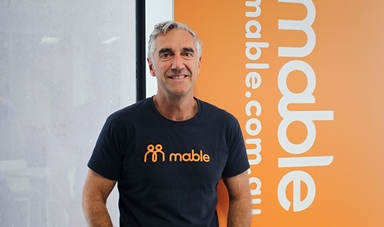Loading component...
At a glance
Like most people with elderly parents, Peter Scutt wanted to ensure his received the best care. His father was in his early 90s and his mother, who was in her mid 80s, was living with dementia. Both parents wanted to remain in their home in regional New South Wales.
The traditional system meant an ever-changing roster of workers, which Scutt says was disconcerting for his parents and concerning for him, as he felt it compromised continuity of care. “The sector was not serving them well, nor the workers who were supporting them,” says Scutt. “I felt a marketplace approach could solve a lot of the challenges.”
The result is Mable, a peer-to-peer marketplace for aged care and disability services that Scutt co-founded with Tony Charara in 2013. Traditional care models have often placed hierarchical organisations between care workers and consumers; Mable cuts out the middleman by bringing them together based on mutual choice.
Assistance may come in the form of domestic help, social interaction and health care, and people can search for local support workers via the Mable website.
Mable’s 13-step vetting process, including qualification and police checks, ensures support workers are suitable. A rating and review system aids transparency and accountability.
An age-old problem
By 2056, an estimated one in four Australians will be aged over 65, and almost two million of them will be older than 85. The country’s aged-care industry, the subject of a Royal Commission, is valued at over A$20 billion and employs more than 224,000 staff across more than 1800 businesses.
It has also undergone significant transformation since February 2017, when all home care packages were provided to individual consumers, rather than awarded to approved providers under the former allocation process. The result is a market-driven environment for in-home aged care, where companies such as Mable can thrive.
Originally called Better Caring, Mable employs about 60 people and has more than 70,000 signed up to its platform. Care recipients can pay privately or via government funding options, such as the National Disability Insurance Scheme (NDIS) or home care packages.
Mable charges consumers a flat fee of 5 per cent, which recipients pay in addition to their support worker’s hourly rate, which typically ranges from A$30-A$40. Scutt says the company is recording compound growth of 8 per cent to 10 per cent per month.
“The government has shifted funding into the hands of the consumers, and consumers really value those frontline workers.”
Taking the marketplace to market
After developing the marketplace model, Scutt and Charara sought advice from COTA (Council on the Ageing) and its chief executive, Ian Yates, took on an advisory role. “That really gave us confidence to raise capital and build a minimum viable product,” says Scutt.
A former partner with Bankers Trust in New York, Scutt had launched the company’s venture capital fund in the late 1990s and drew from his experience in financial services when raising funds.
“In those early rounds, we were able to go to people who knew us and there was a lot of trust that we would do what we said.”
Mable has raised A$11 million to date in a series of rounds, and is now closing a larger funding round. Early investors included Ellerston Ventures and Macdoch Ventures.
“There needs to be a lot of resiliency in the early days because no matter how strong the value proposition is, it never sells itself and succeeds on its own. With two-sided marketplaces, it’s not only about building the technology, but you’ve also got to bring both buyers and sellers together.”
Scutt says the team at Mable focuses on deploying more features on the platform and has recently hired a former Google staffer as its chief product and technology officer.
“We feel that Mable is a proven model,” says Scutt. “In the context of the Royal Commission, there will be greater focus on aged care, and people living in their home is going to be a big part of the future. Using technology to connect people in local communities is the way forward for aged care and disability support.”
One piece of advice
You have to be confident that it’s not just a good idea. You need to also see a pathway to it being a good business.”

